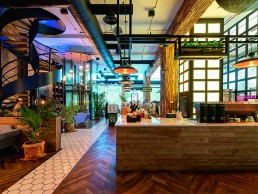
Brew92, Saudi Arabia
Interior design firm Liqui Design, creates a modern, fresh approach to the Saudi coffee shop experience at Brew92’s flagship store.
British interior design studio, Liqui Design, has recently completed the interior design of flagship coffee shop and roaster Brew92, a Saudi Arabian speciality cafe and roasters. Located in Al Khayyat, Jeddah, Brew92’s impressive flagship space is a testament to Liqui Design’s fresh, imaginative and artisanal approach to design.
Liqui Design has created a number of original coffee shop interiors across the Middle East from Dubai to Abu Dhabi and Jeddah, with the flagship Al Khayyat cafe and roastery its second project for Brew92. Throughout Saudi Arabia, the speciality coffee scene is burgeoning and offers a popular alternative to traditional Arabic coffee (a drink that is prepared and served in accordance with a strict etiquette). While Western coffee chains are popular, there is a growing third wave coffee movement that considers coffee as an artisanal foodstuff – a trend that is especially attributable to millennials. Moreover, speciality coffee shops provide forums for social events, from poetry readings to art exhibits.
With a keen appreciation of Saudi Arabia’s speciality coffee scene, Liqui Design worked with Brew92 to create an environment that appeals to coffee connoisseurs and art and fashion enthusiasts alike. By combining reclaimed wood, green foliage, blue tones and industrial components, Liqui Design achieved a space that embodies the Brew92 brand and ethos.
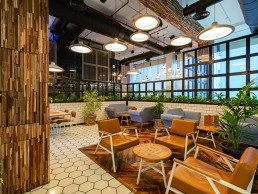
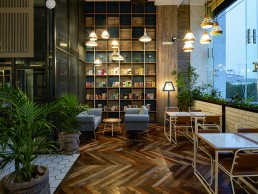
The Al Khayyat cafe and roastery began as a large, open and bare two-storey building, devoid of character and charm. Liqui Design reimagined the space with the bold, bright and airy look and feel of a modern warehouse. Despite its scale, the cafe and roastery is imbued with warmth and personality.
Commenting on his first meeting with Brew92, Liqui Design Creative Director, Cameron Fry, told darc: “The client is the son of one of the biggest food groups in Saudi Arabia. Educated in New York and the UK and having experienced Western culture, his concept was to bring western speciality coffee to Saudi Arabia.
“We met through the London Coffee Festival, which we designed the brand experience for. He was looking for coffee shop designers and, from seeing our work at the festival, asked us to set up his speciality coffee concept in Saudi.”
Brew92 wanted Liqui Design to create a cosy, yet industrial feel for the flagship store, which was difficult to pull off, given Fry and his team had to fill a 600sqm space – 400 more than the concept store they had worked on previously. But, upon visiting the store post-build, Fry was amazed at how intimate it actually feels despite its size.
On the industrial feel, Fry explained: “They don’t really have old buildings in Saudi like we do in the UK, so we tried to, without it being faux, make the space feel like a coffee shop you would find in London.
“Brew92 required the space to work from day to night and be a place that would attract everyone, whether you’re seventeen-years-old or 60-years-old – a feat already accomplished by Bar92’s branding.”
Doubling up as a roastery, with a magnificent glazed partition separating the artisanal space from the rest of the shop, the design allows people to see exactly how the coffee is roasted and prepared. There is also a large, bespoke island coffee counter and striking spiral staircase that take centre-stage in the space.
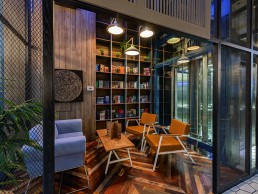
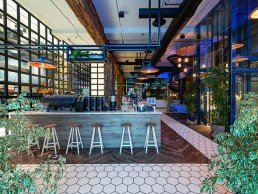
In order to adhere with Saudi law, the coffee shop needed to be split into areas for singles and families. This separation is a staple in Saudi culture and the owners wanted to both respect their heritage, yet move forward with modern cultural trends that are beginning to take place in the country. To achieve this, Liqui Design divided the space into a number of smaller seating areas, delineated by natural wood flooring. In addition, private lounge ‘rooms’ for families offer a sense of privacy yet are not completely closed off from the rest of the space; instead they are enclosed within a light industrial mesh.
Liqui Design’s own furniture and lighting designs were used for the project, some of which were specifically created to fit the concept of the store. Manufactured in the UK by Liqui Contracts, the furniture and lighting pieces are made with sustainable materials and combine traditional craftsmanship with modern innovation.
Commenting on the use of light within the space, Fry tells darc: “We tried to use as much decorative lighting as we could in order to accomplish the job of architectural lighting. A lot of the time we had directional spots hidden in the background to make sure that we were lighting all the spaces correctly. We tried to put enough different decorative features in so at night it becomes a lot more atmospheric, which worked really nicely.
“The introduction of our Symbol standard light fixtures in one of the seating areas, worked really well because of the way the light is cast against the wall. They glow in the space rather than providing directional task lighting, which would be a killer.
“By using these fixtures, it gave us more light around the tables without using pendants, which is something you get stuck with sometimes. Same with the bespoke elements, we used our Trafford lights running up the bookcase in conduit and positioned over – looking almost like street lights. This was done to try and give the same downlight effect on the bookcase but with a different medium. We tried to use all the different variants we could whilst still casting enough light.”
In order to reinforce the feeling of being cosy, the design team experimented with the ceiling height, attaching their Work light fixtures to a disc and dropping them to bring the ceiling height down slightly. The same was done with the bar, a metal structure was dropped around the bar to bring the visual height down and Liqui’s Trafford pendants were suspended from that section rather than just dropping them straight from the ceiling.
Lighting was also used to create a discreet, shaded barrier between the different seating areas. The shadow lines between areas have customers almost walking in the shadows towards the lighted seating areas.
“We didn’t want to put tall walls up as we thought it would ruin the flow of the unit and didn’t fit the new cultural direction of the country,” says Fry. “So instead we put up mid-walls with plants in the top so you still have the feeling of scale.
“The clients were fantastic to work with as they had complete trust in us from the beginning, allowing us to make adjustments and play around with the design. State-of-the-art VR technology was given to the contractors working on the site as well, which made the process a lot easier and allowed them to physically see how we wanted the shop to look.
“Having visited the coffee shop since it opened, it is an impressive space – we want people to have a bit of a breathtaking moment when they walk up to the front door,” continues Fry. “It glows from the outside and is definitely attracting attention in the region, with queues around the block on opening night.
“It’s the biggest interior we’ve done to date and we’re so proud of it, it’s definitely been a learning curve for us.”
Fry’s pride is much deserved considering Liqui Design’s efforts in achieving a cosy look and feel in such a large space, while managing to create a social space that balances old and new culture, pushing the boundaries for Saudi’s budding younger generation.


